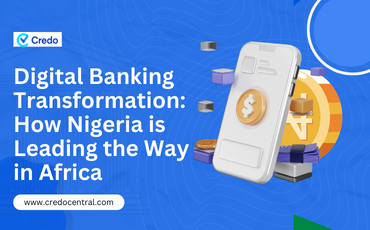Discover how Nigeria is leading in digital banking transforming and the surge in digital payments, projected to hit US$31.28 billion by 2028.

The digital banking revolution is moving swiftly across the globe, and Nigeria is leading this transformation in Africa. The country’s finances is going through a profound shift, driven by digital banking transformation and financial inclusion.
This article will explore how Nigeria is leading the way in digital banking transformation in Africa, focusing on fintech, digital payments, digital banks, and payment gateways.
The Rise of Fintech in Nigeria
Fintech, or financial technology, is a rapidly growing sector in Nigeria. The FinTech Association of Nigeria (FintechNGR) has been instrumental in developing the financial technology ecosystem in the country.
Fintech companies in Nigeria have been successful in democratizing access to financial services, capturing the attention of global investors along the way.
Nigeria boasts several fintech unicorns—companies with a valuation over $1 billion—such Credo, Skaet, E-transact, flutterwave E.t.c.
These companies have pioneered services like mobile banking, digital payments, and peer-to-peer lending platforms, breaking down barriers and making financial inclusion a reality for millions of Nigerians.
Digital Payments: A Growing Market
The digital payments market in Nigeria is projected to grow by 10.06% from 2024 to 2028, resulting in a market volume of US$31.28 billion in 2028. Electronic payments are a large and fast-growing market in Nigeria, generating an estimated $2.1 billion in revenue as of 2021.
The Central Bank of Nigeria (CBN) has introduced initiatives to support the growth of digital payments, including the POS and agent banking system in 2013, a domestic card scheme to rival foreign cards, and Africa’s first digital currency, the eNaira, in October 2021.
These initiatives have hastened the adoption of cashless payments, generating strong organic demand for digital-payment solutions by merchants of all sizes.
The Emergence of Digital Banks
Digital banks are becoming increasingly popular in Nigeria due to their low charges, convenience, and seamless internet-based experience. Banks such as Kuda Bank, VBank, Rubies, Sparkle, Mintyn, Eyowo, Fundall, Gomoney, ALAT, and One Digital Bank by Sterling have been recognized as some of the best online banks in Nigeria.
These digital banks provide a range of services, from traditional banking fares like checking and savings accounts to innovative features like virtual cards, free Verve debit cards, access to loans and investment accounts, direct payments for bills and airtime, cardless cash withdrawals, and foreign exchange transfers.
Payment Gateways: Facilitating Digital Transactions
Payment gateways play a crucial role in the digital banking ecosystem by facilitating secure and efficient internet-based transactions. They are known for their technologically adept personnel, who provide exceptional services, making them a threat to traditional brick-and-mortar banks.
The Impact of Digital Transformation on Nigeria’s Economy
The digital transformation in Nigeria’s banking sector has had a significant impact on the country’s economy. It has accelerated financial inclusion, providing banking services to the unbanked population.
Through online and mobile banking, customers can now access their accounts, transfer funds, pay bills, and conduct various financial transactions conveniently.
Digital transformation has also enabled banks to introduce innovative products and services, allowing individuals without access to traditional banking services to participate in the formal economy, contributing to economic growth and poverty reduction.
Benefits of Digital Transformation on Nigeria’s Economy
Digital transformation is reshaping Nigeria’s economy, driving growth, and fostering innovation. The country’s digital economy is poised to drive economic growth, create jobs, and foster innovation.
This section will delve into the profound impact of digital transformation on Nigeria’s economy, focusing on the growth projection, the benefits, and the role of digital transformation in Nigeria’s economic development.
Growth Projection in Digital Transformation
Nigeria’s digital economy is growing at an unprecedented rate. Real-time transactions are forecast to rise to 8.8 billion annually by 2026, a 5-year CAGR of 18.6 percent. This growth is expected to unlock US$6 billion of additional GDP in 2026, representing 1.01 percent of the country’s GDP.
Let’s talk about the digital payments scene in Nigeria. Picture this: back in 2016, the total value of naira transfers was a whopping 38.2 trillion. Impressive, right? But hold on a moment, because you are about to be shocked. The impressive growth we seen over the years is so oustanding.
this growth is so outstanding and it more like watching your favourite football team grow from a local street football to a top champions league clup in a vew year.
This exactly whated happened in the Value of digital payments, but from 2016 that figure grew to 387.1 trillion by the end of 2022. and In the first five months of 2023 alone, the transaction activity amounted to 211.1 trillion naira, signaling further acceleration.
Benefits of Digital Transformation to Nigeria’s Economy
Digital transformation is bringing about significant changes in the way businesses operate and growth is driven. The growth of the tech sector, driven by the rise of e-commerce, mobile financial services, and the increasing use of digital technologies in key industries, is providing a significant boost to the overall economy and is set to continue in the years to come.
The surge in digitalization, driven by robust mobile network infrastructure and innovative policies, has ushered in a new era of possibilities. This transformation has illuminated its role in catalyzing sustainable development across various sectors.
Role of Digital Transformation in Nigeria’s Economic Development
Digital transformation is playing a pivotal role in Nigeria’s economic development. The country’s Economic Recovery and Growth Plan 2017–2020 (ERGP) recognizes the need for a digital-led growth strategy. In 2015, the Nigeria Communications Commission proposed the transition of the economy into a digital economy and more specifically broadband, which is a key driver of digital economy growth.
The digital transformation in Nigeria’s banking sector has accelerated financial inclusion, providing banking services to the unbanked population.
Through online and mobile banking, customers can now access their accounts, transfer funds, pay bills, and conduct various financial transactions conveniently.
In conclusion, digital transformation is not just reshaping Nigeria’s economy; it’s also creating a brighter future for the country.
With the right policies, strategic partnerships, and a commitment to digital inclusion, Nigeria can leverage its digital economy to drive sustainable growth and development Citations:
Conclusion
Nigeria’s embrace of digital transformation in the financial sector is a beacon of hope for Africa. It offers a path to economic prosperity, financial stability, and entrepreneurial growth for those who have long been excluded.
As digital banking and mobile financial services continue to evolve and expand, they illuminate the way forward, casting a brighter future for Nigeria’s marginalized populations.
With a young and tech-savvy population, burgeoning access to mobile technology, and a dynamic payments ecosystem, Nigeria presents an enticing opportunity for international businesses.
As the digital revolution unfolds, Nigeria is set to continue leading Africa’s charge into the future of finance.
The rise of online marketplaces has allowed local businesses to reach a broader customer base, while also providing consumers with a wider range of products and services.
This has been particularly beneficial for rural communities, where access to physical stores can be limited.
The digital economy has also facilitated the growth of Nigeria’s tech start-up scene, with an increasing number of young entrepreneurs leveraging technology to provide innovative solutions to local problems.
These start-ups are not only contributing to economic growth, but also driving social change by addressing issues such as access to healthcare, education, and clean energy.
The digital transformation has also had a significant impact on Nigeria’s public sector. Government services are becoming increasingly digitized, making them more efficient and accessible to the public.
This has resulted in improved transparency and accountability, as well as increased citizen engagement.
The growth of the digital economy has also led to a surge in demand for digital skills.
This has created new opportunities for Nigeria’s youth, who are now able to access a wide range of online courses and training programs.
As a result, many young Nigerians are now pursuing careers in fields such as software development, digital marketing, and data analysis.
However, despite these positive developments, there are still challenges that need to be addressed.
These include issues related to infrastructure, such as unreliable electricity supply and limited broadband access, as well as regulatory challenges and the need for greater investment in digital literacy programs.



